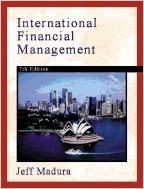Answered step by step
Verified Expert Solution
Question
1 Approved Answer
Please explain step how you got your answers to questions 2 and 3 . Big B Coffee Roaster is considering replacing one of its existing
Please explain step how you got your answers to questions and
Big B Coffee Roaster is considering replacing one of its existing machines with a new, more
automated and efficient machine. The old machine was bought five years ago for $ It is
being depreciated on a straightline basis over a fifteenyear life. The machine could be sold
today at $
The new machine will cost $ and its depreciable life is ten years with a salvage value of
$ However, in accordance with US tax law, the asset will be depreciated down to zero
over the ten years via the straightline method.
In Big Bs existing coffee roasting machine accounted for annual revenues sales of
$ and had annual operating costs of $ The new machine will increase this revenue
to $ per year. The machine will also increase operating costs by $ per year. Finally,
the new machine requires that the company raises its inventory of green coffee beans by $
The cost of capital for Big B is and the corporate tax rate is Big B has profitable
ongoing operation that can be used to offset losses. Should Big B replace the old machine with
the new one?
QUESTION POINTS:
On the first worksheet of the template, identify the relevant and irrelevant cash flows in this
problem and further categorize the relevant cash flows into three categories: a Initial Outlay,
b Aftertax annual cash flows, and c Terminal Cash Flow. On the second worksheet of the
template file complete the data section, and calculate the initial outlay, annual ATCF and
terminal cash flow. Then, calculate the cash flows each year years complete the timeline
table and calculate the NPV and IRR. Should the project be accepted?
QUESTION POINTS:
The managers of Big B now realize that some of the base case assumptions they made are not
totally correct. Specifically, the increase in revenues and operating costs are unpredictable. The
same is true for the salvage value of the new equipment at the end of its life years from
today
Even though projected increase in operating costs is $ past experience from other
companies using the same equipment indicates that operating costs vary significantly fromyear
to year. One of Big Bs cost analysts has come to the conclusion that increase in operating costs
will follow a normal distribution with a mean of $ and a standard deviation of $
Increase in revenues will depend on the overall state of the economy in a given year. Analysts
believe that the increase in sales is not going to be less than $ but if the economy is in
good state the increase in sales can reach as much as $ Big Bs analysts have decided to
use a uniform distribution with a minimum of $ and a maximum of $ to model the
increase in sales variable.
Finally, the actual salvage value of the new equipment at the end of its life is most likely going
to be $ but it could range from $ to $ depending on the technological
advancements in the industry. Big Bs analysts have decided to use a triangular distribution to
model the sale price of the new equipment in years.
Big B wants to evaluate how these uncertainties might affect their decision to buy or not the
new equipment. They want to find out what the expected NPV and IRR of the project are, which
variables have the biggest effect on them and what they can do to limit the uncertainty. Use
@Risk to run a simulation and provide answers to the following questions. Make sure that you
create include the full report of the simulation to the files you post online and justify your
answers name the workbook Simulation results Remember that each year should be
modeled independently of the rest. Use trials for each simulation.
a What are the expected NPV and IRR?
b What is the probability of getting a negative NPV
c What is the most important source of uncertainty?
d How important is the actual sale price of the equipment at the end of year
QUESTION POINT:
Assume the company that is selling the equipment is offering the following service plan with
their equipment: If the operating costs in a given year exceed $ they will pay for the
additional costs. For example, if the operating costs in a given year are $ then they are
going to give Big B $ if the costs are $ then they will give Big B $ If the operating
costs turn out to be $ then nothing happens. Incorporate this adjustment in your model
you will need to use the IF function rerun the simulation and answer the following questions.
Include a copy of the simulation report in the files you post name this workbook Simulation results
a What is the expected NPV with the service plan?
b What is the probability of getting a negative NPV Does it improve compared to Q
c How much would you be willing to pay for a service plan like this and why
Step by Step Solution
There are 3 Steps involved in it
Step: 1

Get Instant Access to Expert-Tailored Solutions
See step-by-step solutions with expert insights and AI powered tools for academic success
Step: 2

Step: 3

Ace Your Homework with AI
Get the answers you need in no time with our AI-driven, step-by-step assistance
Get Started


